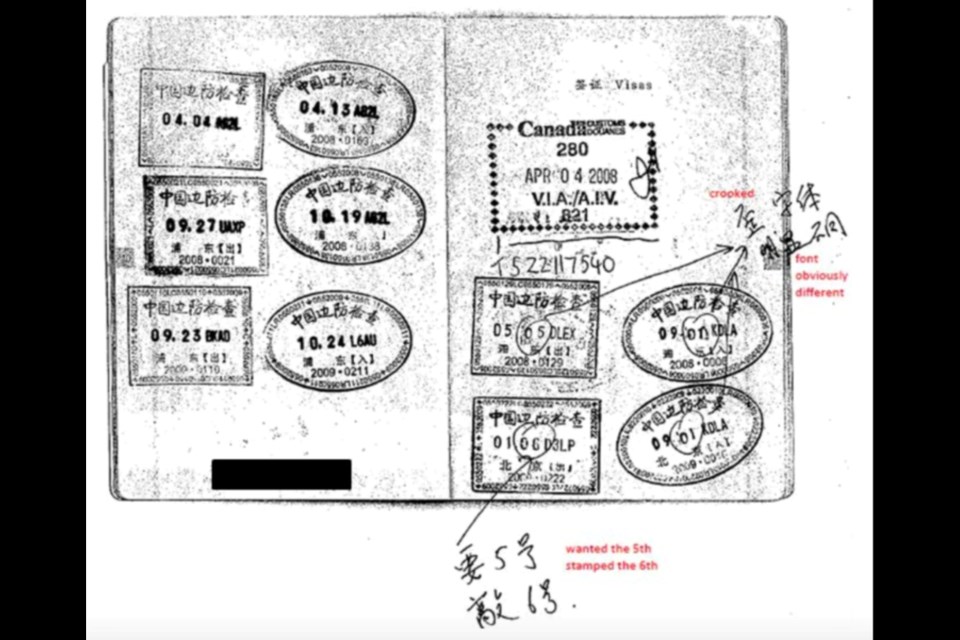A 45-year-old Port Coquitlam woman linked to B.C.’s biggest immigration fraud investigation — and who was scheduled to be deported — has had her case appealed based on humanitarian grounds.
That’s according to an Immigration and Refugee Board decision handed down in August, but not released until this week.
Jie Yi Huang, a permanent resident of Canada, had a removal order made against her on Sept. 11, 2019 after the board found she had committed misrepresentation by submitting false information related to her and her husband's travel and employment history and dates of residence in Canada.
The falsified information came to light following a Canada Border Services Agency (CBSA) investigation into the activities of Xun ‘Sunny’ Wang, as well as two companies he ran, NewCan Consultants Ltd. and Wellong International Investments Ltd.
When CBSA investigators combed through NewCan's offices, they turned up Huang’s and her husband’s names on several records relating to applications to renew their permanent residency.
LARGEST FRAUD INVESTIGATION IN B.C.'S HISTORY
Xun Wang’s fraud operation was built on helping permanent residents renew residencies or acquire Canadian citizenship by falsely representing the clients’ time in Canada, according to the board's ruling.
About 1,200 clients paid the company roughly $10 million for its fraudulent services, which included affixing fake stamps to clients' passports; falsely declaring time in Canada on applications; providing fabricated addresses and phone numbers; and providing trumped-up proof of employment by such means as issuing false T4 tax slips.
Or as the immigration board put it in the ruling: “NewCan conducted a large-scale fraud against the Canadian Immigration system.”
The fraud was first discovered when Citizenship and Immigration Canada (CIC) spotted addresses in Edmonton and Calgary used on multiple permanent resident card renewal applications.
After the agency discovered Huang’s husband, Zheng Hong Yang, had lied about his employment status and residence in Canada, he and their son, now 18, were both ordered deported at an earlier hearing.
All three family members then appealed their deportations together, with the older son — who was a child at the time of the misrepresentation — winning his appeal in an earlier decision based on humanitarian and compassionate grounds.
‘TRICKED’
The court ruling paints a picture of a family struggling to adjust to a new culture at a difficult time in their lives, and a wife who went along with her husband’s plan to hang on to their permanent residency by signing blank documents and providing false information to authorities even though she knew it “was not right.”
Arriving in June 2005, the couple had a second son within three months. Born premature, the family struggled to take care of the new child in an unfamiliar world and without family to help out. By November, they decided to move back to China, go back to their old jobs and buy an apartment as they took care of their ailing parents.
While they visited Canada between 2005 and 2013, at no point did they stay for more than a month, according to the ruling. Recognizing this could affect their permanent residency status, they turned to NewCan for help.
According to the ruling, Wang told Huang’s husband that he could create Canadian income for him so he didn’t have to set up his own company and pay himself a salary. On paper, the husband would be working for Young Dynasty Enterprises Inc., but in reality, Wang never renewed the husband’s permanent residence card based on overseas employment. Instead, altered stamps were added to both husband and wife’s passports, which under-declared their absences from Canada.
Both denied they knew Wang had altered the dates, while Huang said she had been “tricked.”
At the same time, Huang remained in China until 2013, admitting she had falsely represented her time in Canada, including submitting home addresses in Burnaby and Vancouver, neither of which she lived at the specified times.
‘EGREGIOUS’ ACTS BUT VITAL TO SONS’ LIVES
The board found the misrepresentation to be “egregious” and that it eroded “public confidence in the immigration system and its efficacy.”
The Immigration and Refugee Board of Canada “must stand on the bedrock of truthful and reliable information or it risks collapse,” reads the decision.
Despite finding Huang culpable of misrepresentation — as well as providing “evasive and somewhat contradictory testimony” — the board noted her husband “was a more active participant in the NewCan scheme.”
Upon returning to Canada in 2013 after her father-in-law’s death, Huang testified she eventually began building relationships in the community, volunteering, actively raising her two children and working to set up a small business until she was diagnosed with cancer in 2016.
But it was her “active part she plays in her sons’ lives” that swayed the board in granting special relief to the Port Coquitlam mother.
Her husband’s appeal, however, was denied appeal and his deportation stands.



